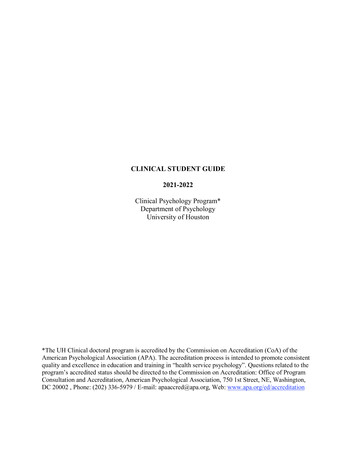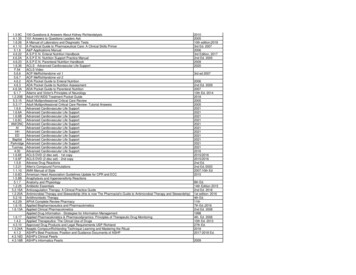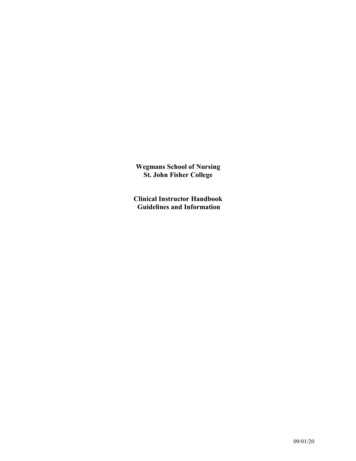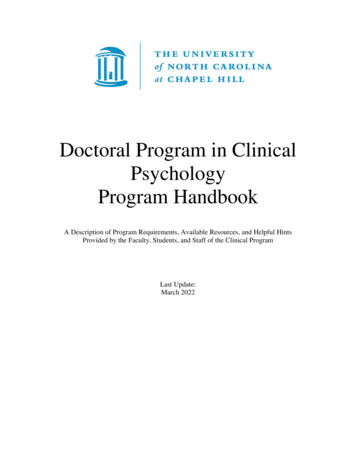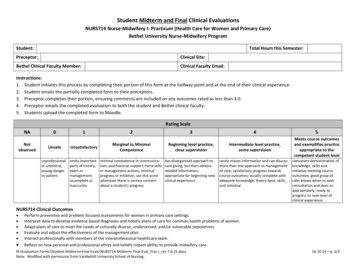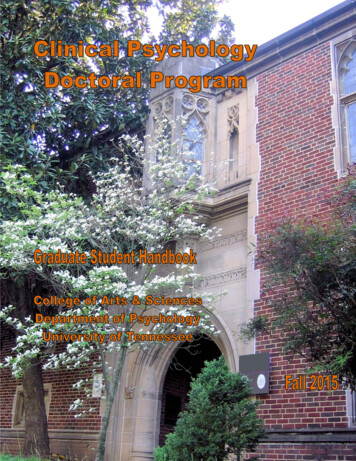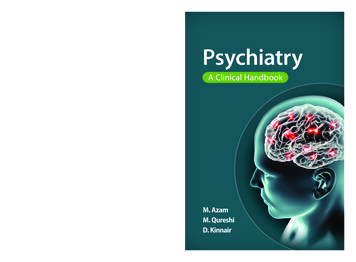
Transcription
CLINICAL EXPERIENCEHANDBOOKDepartment of Teacher EducationSchool of Education and Health SciencesUniversity of DaytonDayton, OH 45469-0266
Table of ContentsOverarching Goals for the Clinical ExperienceDefinition of Terms.1.1.233334444The Clinical Experience ProgramGeneral Guidelines/Course Objectives.Professional Content Standards.Attendance.Teacher Professionalism.Lesson Planning.Reflection.Conferences.Seminars.Course Load/Work.2Expectations of the PersonnelInterns.Clinical EducatorsUniversity LiaisonsPrincipals.Intern Evaluation5.56788Other Related Information9Ohio Standards for the Teaching Profession Evaluation Forms and MentoringOhio Assessment for Educators.Applying for a Teacher License.Time Limit for Licenses/Endorsements Applications.Applying for a Teaching Position.99999Policies & Procedures Governing Removal from Clinical ExperienceAbility to Perform Teacher Performance Responsibilities10.11.12Reasonable Academic AccommodationsApplication for a New Field Placement.12.Clinical Roles & Required Best PracticesHandbook revised 10.12.18.13
Overarching Goals for the Clinical ExperienceThe School of Education and Health Sciences in conjunction with the University of Dayton's Habits ofInquiry & Reflection document has adopted a school wide theme of "Building Learning Communitiesthrough Critical Reflection." The conceptual framework of the School of Education and Health Sciencesembraces diversity for the promotion of social justice, and engages in building a community wherethe faculty model and interns develop as scholar practitioners who engage in critical reflection. Allfour outcomes are addressed in this clinical experience.The University of Dayton's Teacher Education Programs have adopted a theme that is integratedthroughout our entire program of study. The theme of "Teacher as Reflective Decision Maker in aPluralistic Society" is an appropriate choice, considering that the complex needs of students from manydifferent backgrounds demand that teachers have as much preparation for this challenge as possible.The School of Education and Health Sciences and the Teacher Education Programs have adopted thesethemes in accordance with the university's Marianist Mission Statement, which encourages students totake an active role in improving the state of the larger community. This attitude is encouraged whenprofessors and teachers embrace and model qualities of character embodied in the Marianist tradition.These values, found as well in all classrooms, include respect, acceptance, empathy, authenticity,service, compassion, a sense of humor, expectancy of good, concern for the total development of thechild and a commitment to be professional minded. The characteristics of a Marianist education; educatefor formation in faith, provide an integral quality education, educate in family spirit, educate for service,justice and peace, and educate for adaptation and change are integrated throughout your University ofDayton education, and may also become a part of your educational philosophy as a teacher.This experience supports the Ohio Standards for the Teaching Profession (OSTP), which includesknowledge, skills, and performances addressing: Students, Content, Assessment, Instruction, LearningEnvironment, Collaboration and Communication, and Professional Responsibility and Growth. Theexperience also aligns with the departments standards, which are based on the InTASC (Interstate NewTeacher Assessment and Support Consortium) Standards, and as such prepares beginning teachers tothink about teaching and student learning. This is especially effective when considering and assessingthe individual needs of students in a diverse student population.Definition of Terms:Clinical Educators – Licensed practitioners in P-12 schools who provide instruction,supervision, and direction for interns during field-based assignments.Clinical Experience –The internships that provide interns with an intensive and extensiveculminating activity. Interns are immersed in the learning community and are providedopportunities to develop and demonstrate competence in the professional roles for which theyare preparing.Clinical Experience Coordinator – The faculty responsible for coordinating the clinicalexperience for individual licensure programs.Intern – An individual under the supervision of a liaison and a clinical educator immersed intheir preservice clinical experience.Liaison – Higher education faculty responsible for instruction, supervision, and assessment ofinterns during field experience and clinical practice.1
The Clinical Experience ProgramThe clinical experience internship year is a guided experience to prepare individuals for the profession ofteaching. It is an opportunity to work under the mentorship of a qualified teacher who has had at leastthree years of successful teaching experience. Initial licensure clinical experience may extend over anentire semester or some portion of a semester, depending upon the prior experience of the intern.Program faculty may extend the clinical experience. Interns are required to complete their clinical experience in the Miami ValleyInterns must complete and have a clear BCI& I and FBI background check before their clinicalexperienceInterns will not be permitted to complete their clinical experience in the district where they graduatedInterns will not be permitted to complete their clinical experience in a district where family membersattend, teach or are employed in the school districtGeneral Guidelines & Course Objectives for the Clinical ExperienceThe intern transitions through the developmental stages of observer, participant, co-teacher, and finally,teacher. These roles are not discrete. Interns continue to observe throughout the experience and will beparticipating by the second week of the semester. Each licensure program may share specific guidelinesfor implementation of the different aspects of the clinical experience.Observation. Observation is an active and on-going process. The intern must observe with a clearpurpose in mind: where materials are kept, classroom management techniques, how individual studentsrespond to the teacher, what motivates students, etc. It is important to record observations.Observations should extend into classes taught at grade levels or in subject fields other than those of theclinical educator. The intern should become thoroughly acquainted with the students, school,administrative routine, and the school’s community. (OSTP 1, 2, 3, 5, 6 & 7)Participation. The intern is expected to observe and participate actively in the classroom situation inaccordance with the clinical educator’s schedule. Participation may include helping individual studentswho are having difficulties; monitoring small groups; assisting with routine tasks; keeping records;preparing teaching materials; checking written work; preparing and using technology; and supervising inthe hall, lunchroom, library, and playground. Usually, it is better for the intern to be given responsibilityfor participating in some activity with the entire group (during a brief period) no later than the end of thefirst week. (OSTP 1, 2, 3, 5, 6, & 7)Co-Teaching. The intern should consider co-teaching for a period of time with the clinical educatorbefore assuming the principle role of teacher. Co-teaching will assist the intern in making the transitionbetween participation and full responsibility teaching. (OSTP 1, 2, 3, 4, 5 & 7)Teaching. The intern should assume the principle role of teacher at a time determined jointly by theintern, the clinical educator, and the liaison. It is expected that, through gradual induction, the intern willassume complete responsibility by the end of the assignment. The timeline for assuming the teachingresponsibility should be established no later than the second week of the experience. This responsibilityshould be assumed gradually, culminating in full responsibility. Each licensure program and individual2
placement varies; therefore, it is best to check the specifics of this requirement with your licensurecoordinator. (OSTP 1, 2, 3 & 4)Professional Content StandardsDuring the clinical experience, interns must be assessed utilizing the various professional programmaticstandards. Liaisons will share these assessments with clinical educators.AttendanceUndergraduate and post baccalaureate interns are expected to complete a full semester (15 weeks) asrequired by the State of Ohio. Interns must make up all absences. However, you should be awarethat performance competence is the final determinant of length of the clinical experience. Internsmust earn a satisfactory evaluation to be recommended for licensure.Interns are expected to be present in the school each day the assigned school is in session. Attendanceis expected except in the case of personal illness or emergencies. The intern must contact the school,clinical educator, and liaison if it is necessary to be absent.In case of extended (absence from your regularly scheduled placement experience for more than 3 days)and/or unexcused absences (includes any reason for missing your field that has not been mentionedand/or approved by your program coordinator and/or university liaison, and/or no prior arrangementshave been made), the intern must notify the Educational Field Office. The review team comprised of theEducational Field Office personnel and the Senior Year Internship Experience Coordinator will considerthree alternatives: 1) extend the clinical experience an appropriate length of time; 2) ask the intern towithdraw and re-enroll in a later term; 3) withdraw the intern from their clinical experience and theprogram. The decision of the review team will be communicated to the liaison, who will notify the studentof the decision.It is the School of Education and Health Sciences Profession’s policy that interns follow the calendar ofthe assigned school. In the event that school and university holidays do not coincide, interns observe theschedule of the school system. This includes the school’s spring recess. (OSTP 7)Teacher ProfessionalismThe intern should acquire an understanding of all of the expectations of teaching. It is important for theintern to learn about record keeping, evaluation, correspondence with families, and other aspects ofteaching directly from the clinical educator. Mentoring conversations about the many dimensions ofteaching, held after school, should be limited to one or two times per week and arranged at theconvenience of both the teacher and the intern. It may be helpful to arrange for one consistent day eachweek to work after the regular school day. Exceptions are opportunities to attend family conferences,faculty meetings, professional development experiences, athletic or other extra-curricular activitiessponsored by the school. (OSTP 6, 7)Lesson PlanningThe intern must become familiar with the students’ background knowledge and experiences prior topreparing lessons for the students. It is equally as important to have a thorough understanding ofcurriculum and the instructional plan of the entire year (past, present and future) before writing lessonand unit plans. It is expected that the intern will prepare daily lesson plans and submit them to theclinical educator prior to teaching for feedback and approval before proceeding with teaching the lessons.The intern must incorporate learning objectives that are appropriate for all of the students. The plan mustalso include teaching methods, activities, instructional materials and evaluation strategies that are3
aligned with the objectives of the lesson. The intern is expected to maintain a file of daily lesson plansand make it available to the liaison when visits to the class are made. Lesson plan formats provided bythe university are to be used during observation. (OSTP 1, 2, 3, 4, 5)ReflectionIn keeping with the departmental theme, of “Teacher as a Reflective Decision Maker in a PluralisticSociety,” the intern will be required to reflect on lessons taught. The intern may be required to keep areflective journal. (OSTP 7)ConferencesConferences should be held weekly between/among intern and clinical educator in an appropriatesetting. These discussions may be about a variety of topics: school philosophy, policies and procedures;professional ethics; planning and preparation; individual needs of students; curriculum; teachingmaterials; methods; evaluation; the community and parental participation in the school program;continuous self-reflection and evaluation; and cooperative assessment of the internship experience byclinical educator and intern.The clinical educator and liaison should confer and document intern growth periodically because theyshare responsibility for mentoring the intern. (OSTP 6)Clinical Experience Seminars for InternsInterns are required to attend all seminars, both Educational Field Office and program-specific seminars.A schedule of the seminars is available at the beginning of the semester. This schedule should beshared with the clinical educator so they are aware if the intern may need to be excused in order to beprompt for the seminars. (OSTP 6, 7)Course Load and WorkAll interns are to follow their school faculty’s contracted hours. If additional course work is required,interns should not carry more than one additional course with their clinical experience. If interns need towork during their clinical experience, work hours must be limited so as not to interfere with a successfulclinical experience. The intern should notify the clinical educator and liaison if taking a course during thissemester or work needs to be continued. (OSTP 7)4
Expectations of PersonnelThe clinical experience internship can be of maximum benefit to the intern, clinical educator, and students inthe schools when all involved work together during this critical experience in the professional developmentof educators.Expectations of the InternThe intern realizes the opportunity that will be provided learning from the expert mentoring of a veteranteacher. This is a privilege for the intern and should be so regarded. As the principle beneficiary of theefforts of all persons involved in the clinical experience program, the intern is responsible for:Orientation Learning students’ names Demonstrate various classroom management strategies Acquainting the clinical educator with any personal background, health considerations, interests, andambitions not on the Personal Data Record that is provided when the assignment is made Completing a medical card and wear it every day on the UD ID lanyard or school ID Observing the time and holiday schedule of the schoolInstruction Becoming familiar with the long-range and unit plans used by the clinical educator Being prepared to take over the class at any time, without warning Completing daily lesson plans including various teaching techniques, student groupings, appropriatemodifications and use of technology. All lesson plans must be made available to the clinical educator forinput and suggestionsAssessment and Evaluation Keeping a written reflection and evaluation of one’s own work as an intern, striving to effectimprovement Creating and implementing a capstone experience, as directed by your program requirements.Collaboration and Professional Development Discuss, evaluate and defend various professional issues pertaining to the field of education Behaving as a professional in relation to the expectations of the school Using good judgment about dress, grooming, and personal habits, being sure to adhere to the schoolpolicies Holding information about teachers, students and home situations in strict confidence Becoming acquainted with the professional and service personnel in the school Taking the initiative in seeking help from the clinical educator Meeting all responsibilities promptly and effectively, especially notifying the liaison, clinical educator,and/or school if any emergency arises that require absence from school Assisting with extra-class activities beyond school hours, on a limited basis, not exceeding twice perweek, such as (a) attendance at an athletic event or dramatic production; (b) family conferences; (c)extra-curricular activities Being prepared to be in the classroom as the primary teacher (as the clinical educator will leave theclassroom periodically for the intern to be the sole teacher in the room). Attending conferences with clinical educator and liaison when scheduled Showing readiness and initiative to assume increasing responsibility as the semester progresses5
Recognizing that one of the conditions of all clinical experience assignments is that the best interests ofthe P12 children must always be the first priorityObserve another teacher’s classroom(s) and reflect on his /her/their practiceParticipating in all clinical educator responsibilities during school hours, such as hall, lunchroom, andstudy hall supervisionRealizing that an intern is permitted to carry the delegated responsibilities only as long as good ethicaland professional conduct is maintained, and recognizing that the intern serves under the direction of theclinical educator, the principal, and the liaisonCommunicates regularly with clinical educator and university (telephone, email, etc.)Expectations of the Clinical EducatorThe clinical educator is a classroom teacher who accepts responsibility for the daily mentoring of an intern,and is the major influence in making the intern’s experience successful. The most effective mentor is onewho has a strong sense of efficacy about the influence of teachers on student learning. Good interpersonalskills, broad background knowledge in content and pedagogy, varied instructional techniques, and anemphasis on the importance of planning are characteristics of effective mentors. The clinical educator isresponsible for:Orientation Becoming acquainted with the background of the intern. A Personal Data Record/ProfessionalStatement containing pertinent information is provided for this purpose Creating a welcoming atmosphere conducive to a harmonious working relationship with the intern Orienting the intern to the school. This includes helping the intern become acquainted withadministrators, teachers, students, and service personnel. It involves helping the intern become familiarwith available instructional facilities, resources, and technological equipment. It includes someunderstanding of the community and awareness of guidance and special education faculty and facilities,fire drills and other emergency procedures, holidays and special functionsInstructional Support Orienting the intern to the work of the classroom. This includes helping the intern understand thecurriculum pattern, the long-range plan for the particular group of students, the plan of the current unit,and the grading system. An understanding of the individual needs of the students including somespecial study of individual student records is vital if the intern is to approach with understanding the taskof guiding the learning experience of the group Finding ways for the intern to assist in the classroom as soon as possible after arrival. Every internneeds to feel useful and a part of the ongoing program in the classroom. Assisting from time to timeeven in minor tasks during the initial observation phase and co-teaching in the transition stage areimportant Providing an increasing number of opportunities for the intern to assume more responsibility for the workof the different classes, gradually working up to full responsibility. Giving instructions and guidance to the intern in private conferences, refraining from interrupting whilethe intern works with the students. If the necessity should ever arise for the clinical educator to takecontrol, it should be done in such a manner that the intern’s pre-professional status is honored Being present in the classroom a majority of the time while the intern is teaching to provide an adequatebasis for evaluation. Absences are needed, however, to provide the intern with a realistic experience.They should be planned in consideration of the needs and the safety of the students and thedemonstrated competence of the intern. The clinical educator always retains full authority and legalresponsibility of what happens in the classroom and can delegate responsibilities only temporarily to the6
intern. Interns are generally not held liable for injury or damages. However, as a precautionarymeasure, they are covered by the university’s liability insurance policy Assessment and EvaluationRecording observations using the Ohio Standard for the Teaching Profession based observation formand/or other forms tied to specific licensure programs. These should be shared with the intern in the postobservation interviews providing written feedback specific to the intern’s teaching acts and interactionsInforming the intern of his/her academic progress frequently using reflection tools from each respectiveprogram during clinical experienceSupervising and mentoring the intern while documenting their growth over time with sufficient frequency tosecure a reasonably accurate appraisal of competence as a prospective teacher through formal evaluationtools Writing a letter of recommendation/summary of practice upon completion of the clinical experienceCollaboration and Professional DevelopmentAttending informational sessions and professional development workshops throughout the term held at theUniversity of Dayton and/or in the schoolsPlanning, participating, and implementing professional development experiences, such as informal seminarswith interns, building-wide teaching seminars, self-studies with liaison, etc.Determining the final grade for the intern in conjunction with the liaisonExpectations of the University LiaisonThe liaison assumes these responsibilities for supervising the activities of the intern:Orientation Providing an orientation explaining site specific and scheduling expectations of respective programsInstructional SupportSupporting the growth of the intern with knowledge of effective teaching methodologies, developmentalsupervision, research based best practices, and content area expertise Assessment and Evaluation Recording observations using the Ohio Standards for the Teaching Profession based observation form isexpected during each visit. The liaison will observe the intern five times spaced at regular intervals.Written feedback is provided to the intern in the post-observation interviews Collaborating and conferencing with the clinical educator and intern in order to document, inform, andmonitor the intern throughout the clinical experience using written feedback or intervention plan if needed Collecting and forwarding assessment forms to the University of Dayton’s Educational Field Office at theend of the term – including evidence of multiple observations, the Mid-Term and Final Assessments,Clinical Educator Letter of Recommendation/Summary of Practice and Liaison Letter ofRecommendation/Summary of Practice Writing a letter of recommendation/summary of practice for the intern at the end of the placementCollaboration and Professional Development Promoting a thorough understanding of clinical experience through seminars and/or meetings withprincipals, clinical educators, and interns Visiting schools regularly to consult/collaborate with clinical educators while mentoring and documentingthe growth of the interns Collaborating and conferring with clinical educator to determine the final grade for clinical experience Facilitating professional development seminars in collaboration with the clinical educators and/or buildingfaculty for interns and/or clinical-educators. Some seminars may include: professional conversations7
(based on observations, strategies, etc.), classroom management, differentiated instruction, book study,scripting, grant writing, action research, and/or other topics of interestSafeguarding the interns from being assigned the role of substitute teacher. In the event of the absenceof the clinical educator, a substitute teacher must be in the classroom, even though the intern may teachall or part of the dayExpectations of the PrincipalThe principal is responsible for:Collaboration and Professional Development Safeguarding the interns from being assigned the role of substitute teacher. In the event of the absenceof the clinical educator, a substitute teacher must be in the classroom, even though the intern may teachall or part of the day Safeguarding the intern from involvement in teacher strikes. The University will remove interns from theschool in the event of a strike Assisting with problem situations upon request of the liaison, clinical educator, or internIntern EvaluationGrading SystemDuring the experience, the clinical educator and liaison will convey to the intern a grade indicative of his/heracademic standing to date. The clinical educator, in collaboration with the liaison, will be responsible for thefinal grade as it relates to the Ohio Standards criteria and/or the programmatic, licensure standards.The evaluation of the work of the intern is a collective effort involving the intern, the clinical educator, theliaison, and at times, the building principal. Self-reflection continually conducted by the intern is one of themost important elements of evaluation. During the experience, the clinical educator and liaison will conveyto the intern a grade indicative of his/her academic standing to date. It is expected that frequentconferences between the clinical educator and the liaison will result in reasonable agreement concerningthe academic grade. The clinical educator and liaison will be responsible for the final grade.Undergraduate letter grade will be determined in accordance with definitions in the following paragraphs.B, B-, C , C, C-, D, and F are grade options as well.A, A-, B ,The post baccalaureate letter grade scale: A, A-, B , B, B-, C, and F. A – This intern possesses personal and professional qualities associated with outstanding beginning teaching;knowledge of subject matter is characterized by both breadth and depth; acquaintance with pedagogical strategies andtechniques are evident. B – This intern has a reasonable command of subject matter and teaching techniques and possesses the personalqualities associated with acceptable performance as a beginning teacher, but still evidences need for growth in his/hercommand of subject matter or use of instructional techniques. C – This intern’s knowledge of subject matter and/or teaching techniques is significantly weak in some specific way. D – This intern is able to finish the assignment, but has a major subject matter or pedagogical weakness. (The gradeof D is not used for graduate students.) This intern will not be recommended for licensure. F – This intern’s performance is inadequate and/or unprofessional. This intern will not be recommended for licensure.8
Other Related InformationOhio Standards for the Teaching Profession Evaluation Forms and MentoringClinical educators are to use the Candidate Preservice Assessment of Student Teaching Tool (CPAST) forOSTP framework observation/assessment form supplied by the Educational Field Office. Forms areavailable from the liaison or the university’s Educational Field Office website.http://www.udayton.edu/education/ed field office/index.phpOhio Assessment for EducatorsInterns in the different programs are expected to pass two to three Ohio Assessment for Educators examsdepending on their licensure and concentration. All interns for Ohio licensure take a ProfessionalKnowledge Assessment test, which is an exam on professional knowledge in the licensure area. Internsthen take specialty test(s) depending on their area of licensure.Further information available Teaching/Educator-Licensure/Prepare-forCertificate bchart.pdf.aspxApplying for a Teaching LicenseAll interns leading to Ohio Licensure must verify they are in “good moral character” and interns must befingerprinted for background check purposes. Electronic fingerprinting is available in the Office of PublicSafety.The submission and approval for first-time license applications must be completed online. Each applicant forlicensure will need a Safe Access for Educators (SAFE) account with the Ohio Department of Educationfound in the Ohio Department of Education website. Each applicant must create a SAFE account. Oncethe SAFE account is validated, you may submit an application for an initial license. The system acceptspayment by credit card. The SAFE account must be completed before the clinical experience begins.Requirements for the various types and grade of licensure are described in the bulletin published by theOhio State Department of Education entitled “Laws and Regulations Governing Licensure.” This bulletinmay be examined in the School of Education and Health Sciences Dean’s office. Information concerningout-of-state requirements for licensure may be obtained from the applicable state education department orboard of education websites.Time Limit for Licenses/Endorsements ApplicationsStudents in the teacher education licensure programs must apply for the State of Ohio and out of statelicensure within 12 months of their program completion.This means that students who apply after the 12-month policy will have to appeal to the Licensure Officerand may have to take additional coursework.Applying for a Teaching PositionThe University of Dayton’s Career Services, http://careers.udayton.edu, offers the Hire a Flyer Network toassist undergraduates and graduate interns in securing employment.9
Policies and Procedures Governing Relocation or Removal fr
Educational Field Office personnel and the Senior Year Internship Experience Coordinator will consider three alternatives: 1) extend the clinical experience an appropriate length of time; 2) ask the intern to withdraw and re-enroll in a later term; 3) withdraw the intern from their clinical experience and the program.

